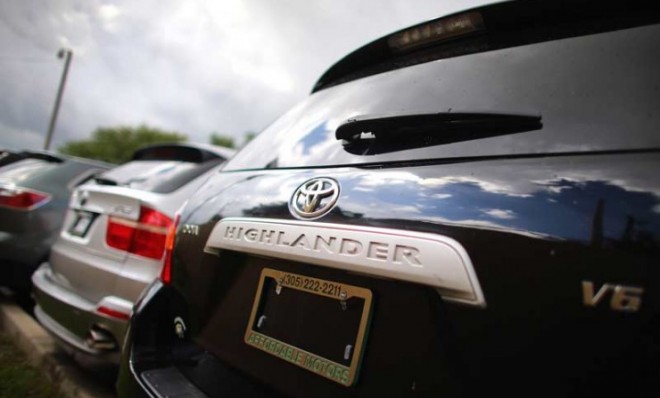Today in business: 5 things you need to know
Auto sales spike after Sandy, Murdoch's iPad-only newspaper shuts down, and more in our roundup of the business stories that are making news and driving opinion


A free daily email with the biggest news stories of the day – and the best features from TheWeek.com
You are now subscribed
Your newsletter sign-up was successful
1. SANDY BOOSTS CAR SALES
Sales of cars and light trucks surged to their best monthly pace in four years in November, as East Coast residents went to showrooms to replace vehicles destroyed in Hurricane Sandy. Ford deliveries jumped by 6.4 percent (analysts had expected a 2.4 percent climb), while Nissan's shot up by 13 percent (up from an expected 4.8 percent increase). Chrysler sales rose by 14 percent. Toyota sales were up 17 percent. Overall, Ford estimated that U.S. auto sales would total as many as 1.13 million cars and light trucks, up 10 percent over the same month last year. [Bloomberg]
………………………………………………………………………………
The Week
Escape your echo chamber. Get the facts behind the news, plus analysis from multiple perspectives.

Sign up for The Week's Free Newsletters
From our morning news briefing to a weekly Good News Newsletter, get the best of The Week delivered directly to your inbox.
From our morning news briefing to a weekly Good News Newsletter, get the best of The Week delivered directly to your inbox.
2. MURDOCH GIVES UP ON iPAD NEWSPAPER
Rupert Murdoch's News Corp. announced Monday that The Daily, the company's iPad newspaper, would "cease standalone publication" on Dec. 15. The Daily was launched with much fanfare in February 2011, but it failed to catch on. It was reportedly losing as much as $30 million a year, and rumors of its impending demise have been circulating for months. Murdoch said The Daily was a "bold experiment" that just didn't find a wide-enough audience. One former reporter for the publication said Murdoch wasn't bold enough. "It sucks," the reporter told Business Insider. "It was a really cool, hip product. I think this is nothing more than bad timing." [Business Insider]
………………………………………………………………………………
3. MIXED SIGNALS ON MANUFACTURING
A free daily email with the biggest news stories of the day – and the best features from TheWeek.com
U.S. stocks got off to a good start early Monday on signs of a manufacturing rebound in China, only to turn mixed after a new report showed that manufacturing in the U.S. unexpectedly fell in November to its lowest level in three years. The report by the Institute for Supply Management suggested that "manufacturing has stalled and has yet to recover," says FTN Financial chief economist Christopher Low. The new worries came as investors are already anxious about the looming fiscal cliff, a collection of automatic tax hikes and spending cuts that economists say could trigger a new recession next year. [Reuters]
………………………………………………………………………………
4. DELTA CONSIDERS BUYING STAKE IN VIRGIN
Delta Airlines is reportedly in talks to buy Singapore Airlines' 49-percent stake in Virgin Atlantic Airways, a move that would make the American carrier a far more formidable rival for the Oneworld global alliance dominated by American Airlines and British Airways. This deal would just be the latest in a series of mega-mergers, as airlines struggle to restore profits in the face of high fuel prices and global economic troubles. It would also amount to Delta's biggest power play since its 2008 merger with Northwest Airlines, and boost Delta's ability to share flights, revenue, and costs with Air France KLM, Europe's biggest carrier, and the other members of its Sky Team alliance. "Delta has shown time and time again that it is extremely opportunistic," said Brett Snyder, an airline expert. "If it sees a good opportunity, nothing is off the table." [New York Times]
………………………………………………………………………………
5. UBS MAY SETTLE RATE-RIGGING CASE
Swiss bank UBS is reportedly nearing a deal with regulators in the U.S. and U.K. to settle charges that some of its employees manipulated Libor — the London interbank offered rate — to increase profits. A settlement would make UBS the second massive bank to admit to rigging Libor interest rates, which are a measure of what financial institutions charge each other for loans. In a similar case, British bank Barclays agreed in June to pay $450 million, the biggest fine ever levied in such a case. UBS is expected to pay the same amount. [Forbes]
Harold Maass is a contributing editor at The Week. He has been writing for The Week since the 2001 debut of the U.S. print edition and served as editor of TheWeek.com when it launched in 2008. Harold started his career as a newspaper reporter in South Florida and Haiti. He has previously worked for a variety of news outlets, including The Miami Herald, ABC News and Fox News, and for several years wrote a daily roundup of financial news for The Week and Yahoo Finance.
-
 6 exquisite homes with vast acreage
6 exquisite homes with vast acreageFeature Featuring an off-the-grid contemporary home in New Mexico and lakefront farmhouse in Massachusetts
-
 Film reviews: ‘Wuthering Heights,’ ‘Good Luck, Have Fun, Don’t Die,’ and ‘Sirat’
Film reviews: ‘Wuthering Heights,’ ‘Good Luck, Have Fun, Don’t Die,’ and ‘Sirat’Feature An inconvenient love torments a would-be couple, a gonzo time traveler seeks to save humanity from AI, and a father’s desperate search goes deeply sideways
-
 Political cartoons for February 16
Political cartoons for February 16Cartoons Monday’s political cartoons include President's Day, a valentine from the Epstein files, and more
